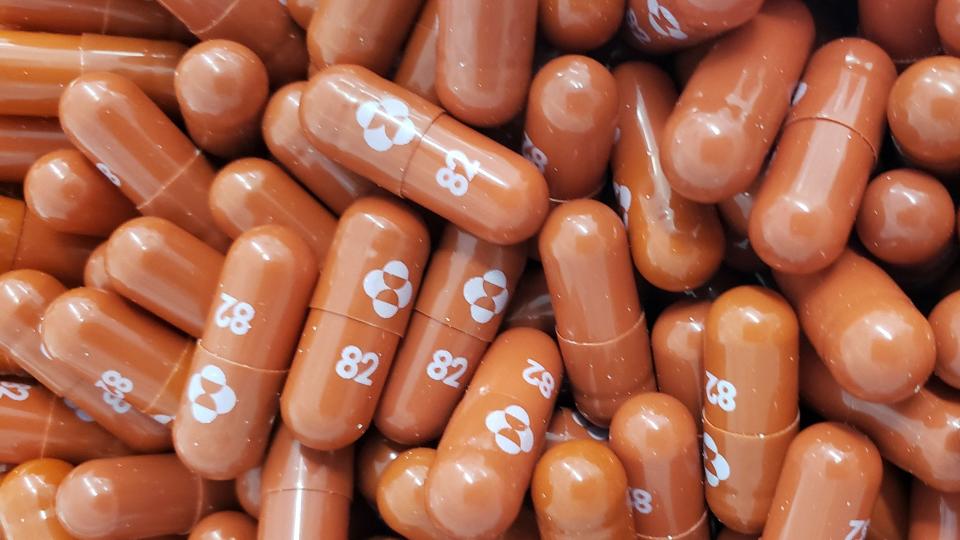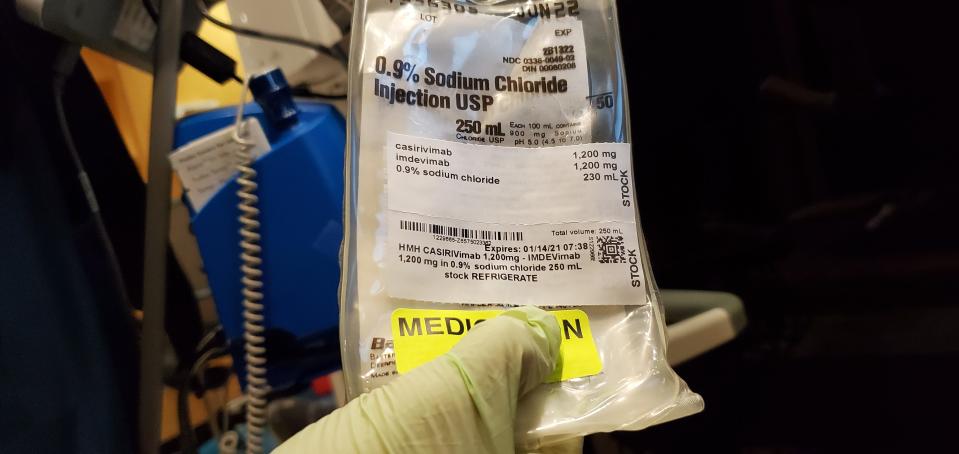New treatments offer hope with vaccines for 'interlocking benefits' against COVID-19
Several new COVID-19 treatments are expected to become available within the next few months.
Each drug fills a slightly different role, but together they could change the course of the illness, at least in the United States.
An experimental antiviral from Merck and a monoclonal antibody from AstraZeneca, along with a handful of other drugs making their way through the development process, could make COVID-19 a much less fearsome disease.
"We're at the point where if we could use these medications all to their interlocking benefits … we could really begin to control the impact this virus has on us, and in particular on the health care system," said Dr. William Schaffner, an infectious disease physician at the Vanderbilt University School of Medicine in Nashville, Tennessee.
COVID-19 won't go away, Schaffner emphasized, but we could make an uneasy peace with it, just as we do with the flu, which in a bad year kills as many as 52,000 people, most of them children and seniors. More than 700,000 Americans have died of COVID-19 in the past 20 months.
The drugs could be taken in sequence, offering layers of protection, both to prevent disease and then, if someone falls ill, to reduce the risk they will have a severe case of COVID-19.
Most need to be taken early in the course of infection, which makes it even more important for people to be able to get tested quickly, said Dr. Rajesh Gandhi, an infectious disease physician at Massachusetts General Hospital and Harvard Medical School, both in Boston.
Additional coronavirus testing, recently provided by the government, should alert people sooner that they are infected.
"If you're in a situation where you are not able to get tested or or it takes too long to get the result back," then the drugs won't work, Gandhi said. "Testing and treatment go hand in glove."
Other drugs under development are aimed at reducing deaths among those who require hospitalization.
None of the drugs is a substitute for vaccination, he said, noting that vaccines cost less than $12 a shot – funded by the U.S. government – and provide excellent protection against severe disease.
But vaccines don't work perfectly, and they don't provide strong protection for people who are immunocompromised or whose allergies prevent them from getting the shots.
"These are essentially backups to vaccines; they're not a substitute for vaccines," Gandhi said. "Having these (drugs) in our armamentarium is helpful."
The Merck antiviral, molnupiravir, when taken at the first sign of COVID-19 symptoms, reduces the risk of severe disease by half, the company said this month.
The drug is delivered by pill.
"It's going to be huge," said Dr. Daniel Griffin, chief of the division of Infectious Disease for ProHEALTH, a health care provider in the New York City region.
Though the antiviral is most effective if given within two to three days of symptoms, the fact that it reduced symptoms by half up to five days later is "pretty exciting," he said. It often takes people a few days to realize they are infected.
Monday, AstraZeneca released new trial data about its monoclonal antibody that showed the double shot, when given within a week of the onset of symptoms, can reduce the likelihood of severe disease by half in people at high risk; if given within five days, the chance of severe disease is cut by more than 67%.
It also offers long-term protection, up to 12 months, the company predicts, meaning it could dramatically improve the lives of people who are immunocompromised and can't get adequate protection from a vaccine.
"Not only have you treated them right then," Griffin said, "but you've treated them for the next year."

Dr. Hugh Montgomery, a professor of Intensive Care Medicine at University College London, who helped lead the AstraZeneca trial, said his sister is being treated for breast cancer. Chemotherapy weakens her immune response and makes it unlikely a COVID-19 vaccine will protect her.
As countries open up and return to something like normal, people like her are even more isolated, he said, because they are more likely to encounter the virus than when everyone was home or masked.
The long-lasting protection provided by the monoclonal antibody, AZD7442, could allow her to see her family and leave home again, Montgomery said.
The people in the AstraZeneca trial were not vaccinated before receiving the drug. Gandi said he'd like to know whether the combination of the vaccine and the antibody will have extra benefits.
"I would be thrilled if they could show that the antibodies add to the protection immunocompromised people receive from vaccines," he said.
What remains unclear, Gandhi said, is whether the antibody would prevent someone from passing on the virus and whether it would shorten the duration of illness.
AstraZeneca has already requested emergency authorization from the Food and Drug Administration to use AZD7442 to prevent infection in someone exposed to the virus. Merck, which collaborated with Ridgeback Biotherapeutics to develop molnupiravir, also has applied for its emergency use.
Another drug combination of two monoclonal antibodies, REGEN-COV from Regeneron, has long been available as an infusion but is now authorized as a four-shot sequence, which is easier to deliver.
Lilly, which also has an authorized two-monoclonal-antibody drug, says that it can be used either for prevention or treatment and that its protection lasts about three months.

The U.S. government is pre-buying the antiviral and monoclonal antibodies to provide at no cost within the country. All the drugs are orders of magnitude more expensive than vaccines, which also are given at no cost.
The government recently purchased 388,000 doses of one of the two Lilly antibodies, etesevimab, for $850 a dose, adding to the $1,250 a dose it had spent on bamlanivimab, which was determined not to be effective on its own. The government paid the same $2,100 per dose for Regeneron's REGEN-COV.
It has also preordered 1.7 million courses of Merck's molnupiravir for $1.2 billion, or $706 per dose, pending its receipt of FDA authorization.
AstraZeneca would not release pricing information about AZD7442, but said it would be in line with other monoclonals.
Though the drugs probably will be prohibitively expensive for some parts of the world, Lilly aims to make its monoclonal antibody affordable.
"The pricing will be tiered based on countries’ ability to pay," spokeswoman Allison Howell said via email, "with wealthy countries paying the same as one another, middle-income countries receiving a steep discount, and the poorest countries paying only marginal costs."
Contact Karen Weintraub at kweintraub@usatoday.com.
Health and patient safety coverage at USA TODAY is made possible in part by a grant from the Masimo Foundation for Ethics, Innovation and Competition in Healthcare. The Masimo Foundation does not provide editorial input.
This article originally appeared on USA TODAY: COVID treatments offer hope for those not well protected by vaccines

